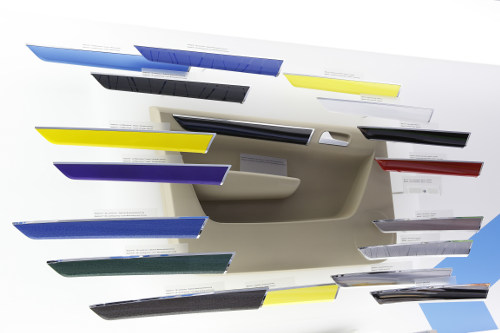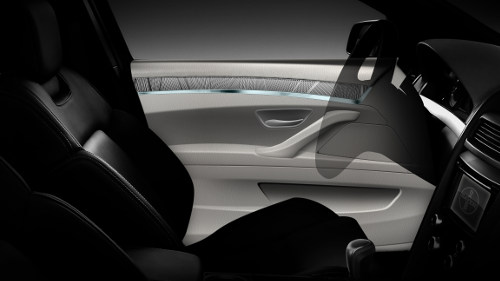 |
| May 06, 2014 | Volume 10 Issue 17 |
Designfax weekly eMagazine
Archives
Partners
Manufacturing Center
Product Spotlight
Modern Applications News
Metalworking Ideas For
Today's Job Shops
Tooling and Production
Strategies for large
metalworking plants
Wheels:
Bayer MaterialScience tries to give auto interiors fast and cost-effective personalization
In virtually no other industry are the demands regarding the quality and diversity of surfaces as high as in the automotive industry. Customers value attractively decorated elements and individual appointments, particularly in the interior. To accommodate this wish, carmakers are developing short production runs with numerous variants on the basis of high-volume base platforms. The focal point for automakers is on the efficient and cost-effective production of components for the respective vehicle class.

At the VDI conference on Plastics in Automotive Engineering this past April, Bayer MaterialScience showed variants of a new decorative plastic trim strip concept using Makrolon and Bayblend products for auto interiors.
Bayer MaterialScience presented a complete, polycarbonate-based decorative-strip concept for the future design of automotive interiors at the VDI conference "Plastics in Automotive Engineering 2014" April 2-3 in Mannheim, Germany. The exhibits aimed to express the potential harbored by the use of Makrolon and Bayblend products in this application.
The concept components were created in close collaboration with Gerhardi Kunststofftechnik in Ludenscheid, Germany. The processing specialist developed an innovative mold concept in which a diverse range of surfaces and design variants can be efficiently produced. The comprehensive performance spectrum of modern Bayer polycarbonate materials enables a single mold frame to be used for a wide range of decorating options, so short-run, specialty decorative touches are easier to produce.
"These include matte and high-gloss structures, attractive shades with deep luster, and also coated, film-decorated, and metallized surfaces," said Dirk Kieslich, head of product and process development at Gerhardi. "This near-series mold can be used to replicate the most common surface design techniques and thus produce a wide array of variants without further processing steps."
"One simple, but effective possibility is the production of three-dimensional laser-engraved graining with two different levels of gloss," said Philipp Moller, project manager and application developer at Bayer MaterialScience's Polycarbonates Business Unit. In this application, the high flowability and processing temperature of the PC+ABS blend Bayblend HG allows for the precise reproduction of the graining. "The structure also provides a natural form of scratch protection," added Moller. The high-quality, glossy surface can then be coated in a particular color using coatings formulated with polyurethane raw materials from Bayer MaterialScience, for instance.

These trim strips were created in close collaboration with the company Gerhardi Kunststofftechnik. They developed an innovative mold concept in which a diverse range of surfaces and design variants can be efficiently produced using Bayer polycarbonate materials.
The use of the metallizable product Bayblend T65 PG greatly expands the spectrum of design possibilities. Attractive chrome surfaces can be produced on the component by means of galvanic plating. Furthermore, fascinating structures with matte or high-gloss designs can be produced using the StrukturChrom process, a decorating technology developed by Gerhardi. Components with integrated lighting highlight the interesting plastic surface below. Three-dimensional laser engraving is also possible.
Polycarbonate films such as Makrofol HF open up further prospects for the visual design of automotive interiors. These scratch-resistant, coated films are robust and, thanks to new processing technologies, can also be shaped three-dimensionally. The result produces components with a customized appearance.
One interesting design variant for controls uses plastic films that produce surfaces with daytime/nighttime designs. These are a good fit with the current infotainment trend. The optical display is only visible when switched on and is produced by means of LEDs behind the film. Otherwise, the driver sees only an elegant, matte-black surface. Bayer researchers developed this black-panel technology a couple of years ago.
Source: Bayer MaterialScience
Published May 2014
Rate this article
View our terms of use and privacy policy
